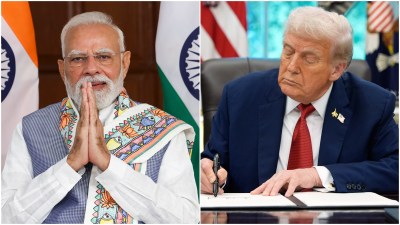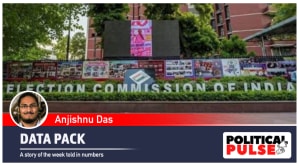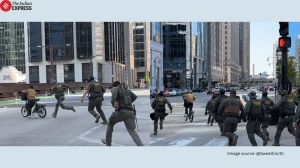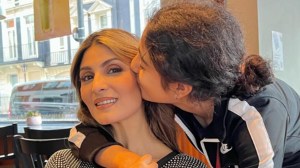Good books, bad books; give me some of them…
At Manil Suri’s book reading last week, the audience was greeted by a tallish, smiling, modest-looking person in a suit...

At Manil Suri’s book reading last week, the audience was greeted by a tallish, smiling, modest-looking person in a suit, who looked more like a Mathematics Professor than like the writer of a best-selling book. It turns out that he is, indeed, er… a Mathematics Professor at the University of Maryland, but is also a writer, the author of the newly released book The Death of Vishnu, the first of a planned trilogy that will also include The Life of Shiva and The Birth of Brahma. “Each line should be as correct and necessary as an equationâ€, says this mathematician.
And that’s a pleasing thing to hear in these verbose days. Suri isn’t in Mumbai merely to promote his new book it’s also a homecoming for him. He was born here, studied at Campion, Jai Hind, and the Institute of Science and more importantly, grew up in the city that he has written about in The Death of Vishnu. The character of the drunken watchman, Vishnu, central protagonist of the novel, is based on a real person named Vishnu, who lived on the landing in the building where Suri grew up.
Based on the east coast of the US now, what does Suri miss most about Mumbai? His website tells us that it is the Alphonso mango (ah well, we can all relate to that) and the pomfret. The story of the Asranis and the Pathaks, the Jalals and widower Vinod Taneja, and of Vishnu himself, is an allegory for this melting-pot of a city. And the Hindi movies, which Suri watched a great deal, figure as a motif throughout the story.
Fortunately for us, Suri and his agent have so far been tactfully able to handle Hollywood queries about whether the story can be located in a New York City building, with Vishnu being the doorkeeper. So we shan’t be seeing Robin Williams as Vishnu then and a good thing too.
The novel, incidentally, began as a short story that Suri had taken to Michael Cunningham’s fiction workshop. The short story grew into not only a novel, but also a trilogy that he now proposes. With Vishnu, and now Shiva and Brahma in the titles, one may expect that the stories will be infused with mythological references. Suri is currently on a sabbatical from the University, but come September, he’ll be teaching again and this time, presumably, it will be equations.
It’s the season for books. There was a huge national book fair in the Cross Maidan at Churchgate some days ago. You had to walk quite a bit from stall to stall, but it was exciting to see so many books on such a variety of topics and so much space given to books. There’s also a book fair going on at Breach Candy right now and another the Strand book sale at Sunderbai Hall. This regular appearance of book exhibitions is a more encouraging sign than anything else about the times we live in. Somehow it always comforts you to know that people are still buying books and, let us hope, reading them. The world doesn’t seem quite so philistine, so doomed, then. We’ve gone religiously to the Strand sale every year and come back with armloads of treasures every time. Almost all the books are on discount. But at the end of one year and the beginning of another, what do your bookshelves look like? Mine are crowded and overflowing but not just with books that I’m glad to own. There is, in fact, quite a bit of junk.Some books I have judged solely by their cover, and on opening the pages, I’ve been let down. Some of the best writers have disappointed me, and so have many new names, especially last year. It was an uneven harvest. I’m still vaguely unhappy with Amitav Ghosh’s new novel, The Glass Palace, even though it was a racy, adventurous read and had some wonderful descriptions; and it was only after I went back to the brilliant, jewel-like Shadow Lines and read it again, that I felt reassured that I was being fair. And then again, perhaps it isn’t possible to expect a tour de force from a writer every time. Similarly, Amit Chaudhuri’s A New World, which I bought after listening to him reading at Fountainhead, had many wonderful moments, but ultimately left you wondering whether you had been cheated of a story.
Sagarika Ghose’s debut book The Gin Drinkers was clever and full of promise, but didn’t quite deliver. Anita Desai’s new collection of short stories, Diamond Dust, is beautifully crafted, but cold to the touch. As for Akhil Sharma’s An Obedient Father, it was so laboured, so dreary, that it made me wonder why I was punishing myself. But there were also treasures: Small Remedies by Shashi Deshpande is one of my favourite books of recent times. Zadie Smith’s energetic White Teeth, which, as Salman Rushdie remarked in his inimitable style, “has biteâ€, but which deserves only accolades, no awards. Elsewhere, a delightful collection of essays originally published in the India Magazine (remember that coffee-table glossy?) and edited by Kai Friese.
And also Saul Bellow’s intelligent and human Ravelstein, which Lotus imported for me after a long wait. And oh yes, the latest Harry Potter, which was a delight. It was a good year, after all.





- 01
- 02
- 03
- 04
- 05

























